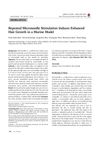 July 2024 in “Pharmaceutics”
July 2024 in “Pharmaceutics” The new hydrogel treatment promotes faster hair growth and better skin health for hair loss.
 25 citations,
July 2019 in “Experimental Dermatology”
25 citations,
July 2019 in “Experimental Dermatology” Cholesterol balance is important for hair health, and problems with it can lead to hair loss conditions.
9 citations,
June 2022 in “Plants” Shallot extract may help with hair growth and treating hair loss.
 8 citations,
June 2022 in “Cosmetics”
8 citations,
June 2022 in “Cosmetics” Coffee berry extract may help slow skin aging and prevent hair loss.
 7 citations,
January 2022 in “Molecules”
7 citations,
January 2022 in “Molecules” Tectoridin helps human hair cells grow and makes mouse hair longer, suggesting it could treat hair loss.
 February 2024 in “Scientific Reports”
February 2024 in “Scientific Reports” Cinnamic acid may help hair grow by activating oxytocin receptors.
 5 citations,
January 2023 in “International Journal of Molecular Sciences”
5 citations,
January 2023 in “International Journal of Molecular Sciences” Hair follicles could be used to noninvasively monitor our body's internal clock and help identify risks for related diseases.
 6 citations,
October 2015 in “International Journal of Women's Dermatology”
6 citations,
October 2015 in “International Journal of Women's Dermatology” Hair aging is inevitable, but using the right hair care products can help maintain hair health.
3 citations,
September 2021 in “Bulletin of the Korean Chemical Society” Dimeric peptide derivatives could help hair growth and treat hair loss safely.
 9 citations,
December 2017 in “The Journal of Allergy and Clinical Immunology”
9 citations,
December 2017 in “The Journal of Allergy and Clinical Immunology” New targeted therapies for hair loss from alopecia areata show promise, with personalized treatment expected in the future.
Hairless mammals evolved quickly in both gene and non-gene areas related to skin and hair.
February 2024 in “International journal of molecular sciences” UV exposure reduced hair shine in mice, but minoxidil helped restore it.
 13 citations,
October 2017 in “Bioscience, Biotechnology, and Biochemistry”
13 citations,
October 2017 in “Bioscience, Biotechnology, and Biochemistry” Centella asiatica extract may help promote hair growth by blocking a specific cell signaling pathway.
 October 2012 in “Medical Hypotheses”
October 2012 in “Medical Hypotheses” Artemis dysfunction might cause hair loss through telomere shortening.
62 citations,
January 2015 in “Journal of Dermatological Science” New genetic discoveries may lead to better treatments for alopecia areata.
 1 citations,
May 2023 in “Frontiers in Pharmacology”
1 citations,
May 2023 in “Frontiers in Pharmacology” Millet seed oil may help hair grow by activating certain cell growth signals.
 April 2023 in “Medizinische Genetik”
April 2023 in “Medizinische Genetik” New research has found 14 genes linked to the risk of developing alopecia areata, improving understanding and treatment options.
 27 citations,
August 2015 in “Experimental Dermatology”
27 citations,
August 2015 in “Experimental Dermatology” Certain electric currents can promote hair growth by activating specific cell pathways.
 1 citations,
July 2018 in “Elsevier eBooks”
1 citations,
July 2018 in “Elsevier eBooks” Heredity and hormones cause common hair loss, and topical minoxidil is the first recommended treatment.
 55 citations,
January 2016 in “Annals of Dermatology”
55 citations,
January 2016 in “Annals of Dermatology” Microneedle stimulation can increase hair growth in mice.
 11 citations,
April 2019 in “Journal of Biological Research”
11 citations,
April 2019 in “Journal of Biological Research” The study identified 12 potential biomarkers for hair loss and how they affect hair growth.
 4 citations,
February 2022 in “Experimental Dermatology”
4 citations,
February 2022 in “Experimental Dermatology” Hair loss in men might be linked to changes in cell energy factories.
 2 citations,
October 2022 in “The journal of investigative dermatology/Journal of investigative dermatology”
2 citations,
October 2022 in “The journal of investigative dermatology/Journal of investigative dermatology” AIRE deficiency causes hair loss similar to alopecia areata in mice.
40 citations,
October 2012 in “Dermatologic clinics” More research is needed to understand the genetic causes of Alopecia areata to develop better treatments.
 34 citations,
July 2018 in “American Journal of Physiology-heart and Circulatory Physiology”
34 citations,
July 2018 in “American Journal of Physiology-heart and Circulatory Physiology” Minoxidil improves blood flow and vessel flexibility, potentially helping with vascular stiffness.
 9 citations,
August 2018 in “Biomedical dermatology”
9 citations,
August 2018 in “Biomedical dermatology” A peptide called DPS-1 helps human scalp cells grow and stimulates hair growth in mice.
 December 2023 in “Journal of materials chemistry. B”
December 2023 in “Journal of materials chemistry. B” A new nanoemulsion increases oxygen for hair cells, leading to better hair growth.
 61 citations,
June 2014 in “Scientific Reports”
61 citations,
June 2014 in “Scientific Reports” Wnt1a-conditioned medium from stem cells helps activate cells important for hair growth and can promote hair regrowth.
1 citations,
December 2023 in “International journal of molecular sciences” miR-199a-3p controls hair growth and is linked to alopecia areata.
14 citations,
June 2021 in “Journal of dermatological science” Argan press cake extract might help grow hair and protect hair cells from damage and inflammation.






















